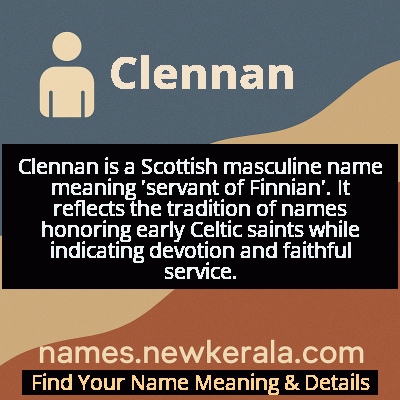Clennan Name Meaning & Details
Origin, Popularity, Numerology Analysis & Name Meaning of Clennan
Discover the origin, meaning, and cultural significance of the name CLENNAN. Delve into its historical roots and explore the lasting impact it has had on communities and traditions.
Name
Clennan
Gender
Male
Origin
Scottish
Lucky Number
9
Meaning of the Name - Clennan
Clennan is a Scottish masculine name meaning 'servant of Finnian'. It reflects the tradition of names honoring early Celtic saints while indicating devotion and faithful service.
Clennan - Complete Numerology Analysis
Your Numerology Number
Based on Pythagorean Numerology System
Ruling Planet
Mars
Positive Nature
Generous, passionate, energetic, and humanitarian.
Negative Traits
Impulsive, impatient, moody, and can be overly emotional.
Lucky Colours
Red, maroon, scarlet.
Lucky Days
Tuesday.
Lucky Stones
Red coral, garnet.
Harmony Numbers
1, 2, 3, 6.
Best Suited Professions
Military, sports, philanthropy, leadership roles.
What People Like About You
Courage, energy, leadership, generosity.
Famous People Named Clennan
Clennan MacLeod
Scottish Clan Historian
Documented the genealogy of Scottish clans in the Western Isles
John Clennan
Agricultural Reformer
Pioneered improved farming techniques in the Scottish Highlands
Robert Clennan
Presbyterian Minister
Founded several churches in Scottish immigrant communities in North America
Name Variations & International Equivalents
Click on blue names to explore their detailed meanings. Gray names with will be available soon.
Cultural & Historical Significance
Historically, the name appears in records from the Western Isles and Highlands, particularly associated with families who maintained strong connections to early Christian foundations. During the Scottish Reformation, names like Clennan persisted in Presbyterian communities, representing continuity with Celtic Christian heritage while adapting to Protestant traditions. The name carries echoes of Scotland's complex religious history and the enduring influence of early Celtic saints on Scottish identity and clan affiliations.
Extended Personality Analysis
Individuals named Clennan are typically perceived as loyal, dependable, and deeply principled, reflecting the name's meaning of service and devotion. They often exhibit strong commitment to their beliefs and responsibilities, showing remarkable perseverance in pursuing their goals. Their personality tends to be grounded and practical, with a quiet strength that others find reassuring and trustworthy in challenging situations.
Clennans are often characterized by their methodical approach to problem-solving and their ability to maintain focus on long-term objectives. They typically value tradition and stability, yet possess the adaptability to navigate changing circumstances when necessary. While they may appear reserved initially, they form deep, lasting relationships based on mutual respect and shared values. Their combination of steadfastness and quiet determination makes them natural leaders in community and family contexts.
Modern Usage & Popularity
In contemporary times, Clennan remains a relatively uncommon name, primarily found in Scotland and among Scottish diaspora communities in Canada, the United States, and Australia. While it has never reached mainstream popularity charts, it maintains a steady presence as a traditional choice for families with Scottish heritage seeking to honor their ancestral roots. Recent years have seen a slight resurgence in interest as part of the broader trend toward reviving historical Scottish names, though it remains distinctive and uncommon enough to stand out while carrying significant cultural weight.
Symbolic & Spiritual Meanings
Symbolically, Clennan represents devotion, service, and spiritual connection through its meaning as 'servant of Finnian'. It embodies the Celtic Christian ideal of faithful service and dedication to higher principles. The name carries connotations of steadfastness, reliability, and quiet strength—qualities associated with those who serve faithfully without seeking recognition. Metaphorically, it suggests a bridge between earthly responsibilities and spiritual commitments, representing the balance between practical service and deeper faith that characterized early Celtic Christianity in Scotland.

